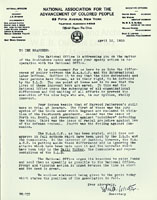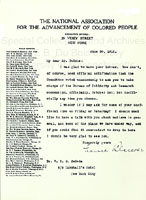The denial of rights and opportunities to ten million Americans of Negro descent is not only unjust and a menace to our free institutions, but also is a direct hindrance to World Peace and the realization of Human Brotherhood.
The Crisis
The NAACP was formed by a coalition of black leaders and white liberals, and Du Bois left Atlanta University in 1910 to become the NAACP's Director of Publicity and Research. Through this position he spearheaded efforts to enact anti-lynching laws and to initiate legislation that would end jim-crow practices in the nation's public institutions and transportation systems. Du Bois was a man of firm opinions and this trait often brought him into conflict with others on the NAACP's Board of Directors. When, in the depression year of 1934, Du Bois advised blacks to patronize black businesses, he was ironically forced to resign from the NAACP for advocating what was considered to be a plan of voluntary segregation.

Du Bois (2nd row, 2nd from right) in a NAACP sponsored demonstration against lynching and mob violence against blacks.

1933 memo from Walter White, NAACP Secretary, urging unity among the organization's branches during the Scottsboro trials.

Letter from NAACP Secretary Francis Blascoer, 1910, offering Du Bois the position of the NAACP's director of publicity and research.

Du Bois receiving the NAACP's Spingarn Medal, Atlanta University, 1920.


 Du Bois (2nd row, 2nd from right) in a NAACP sponsored demonstration against lynching and mob violence against blacks.
Du Bois (2nd row, 2nd from right) in a NAACP sponsored demonstration against lynching and mob violence against blacks.
 1933 memo from Walter White, NAACP Secretary, urging unity among the organization's branches during the Scottsboro trials.
1933 memo from Walter White, NAACP Secretary, urging unity among the organization's branches during the Scottsboro trials.
 Letter from NAACP Secretary Francis Blascoer, 1910, offering Du Bois the position of the NAACP's director of publicity and research.
Letter from NAACP Secretary Francis Blascoer, 1910, offering Du Bois the position of the NAACP's director of publicity and research.
 Du Bois receiving the NAACP's Spingarn Medal, Atlanta University, 1920.
Du Bois receiving the NAACP's Spingarn Medal, Atlanta University, 1920.

